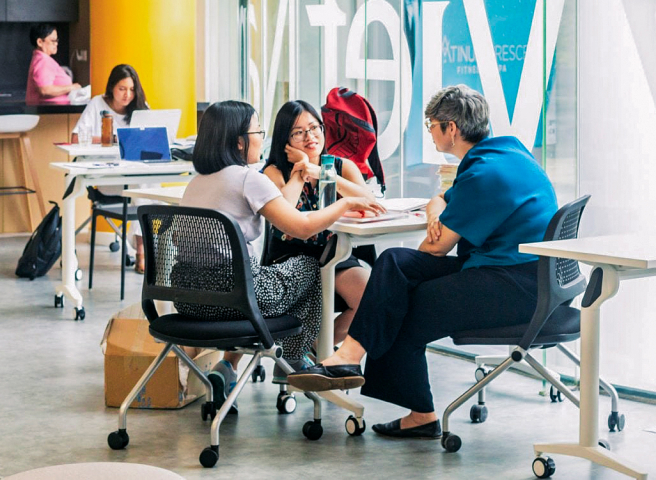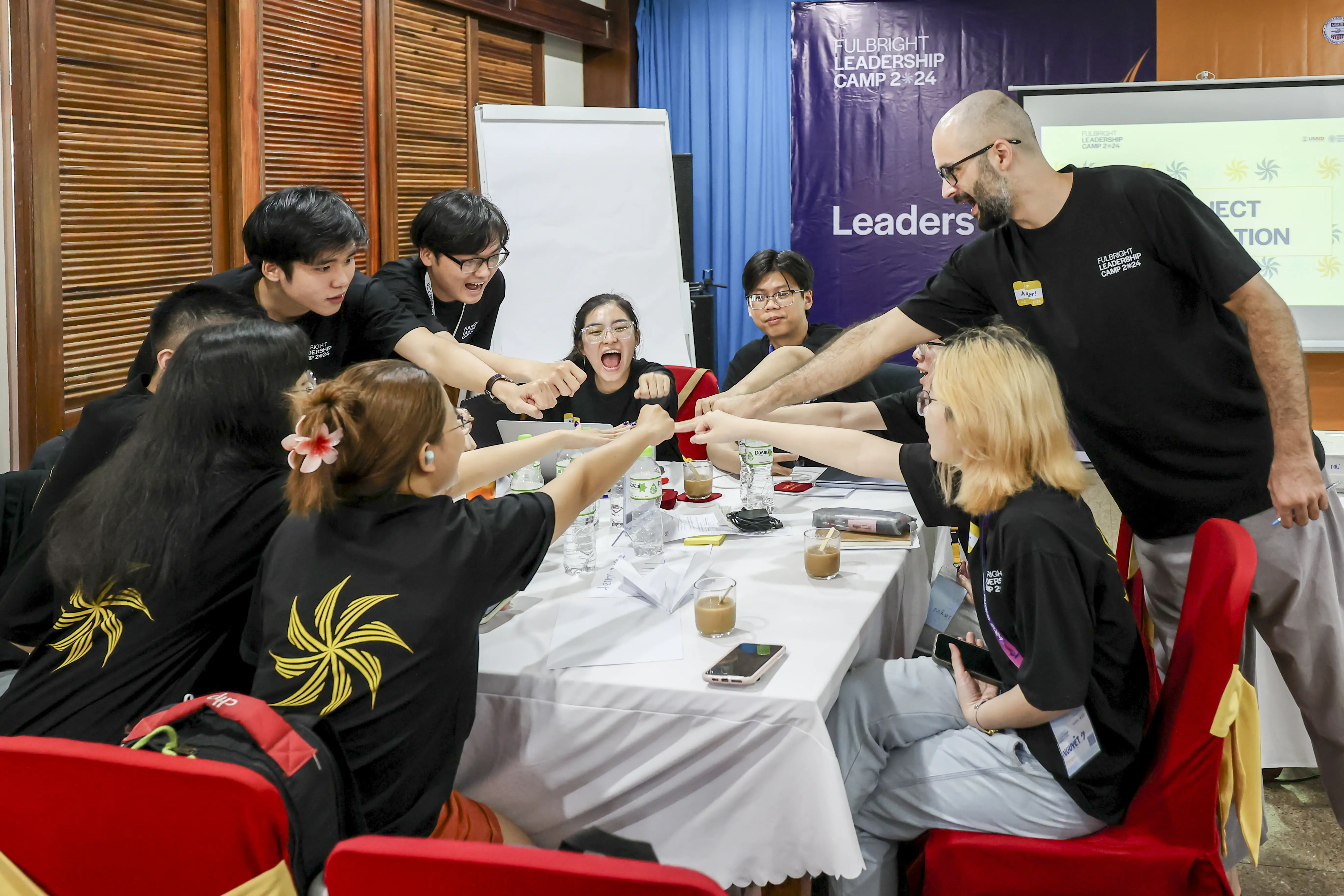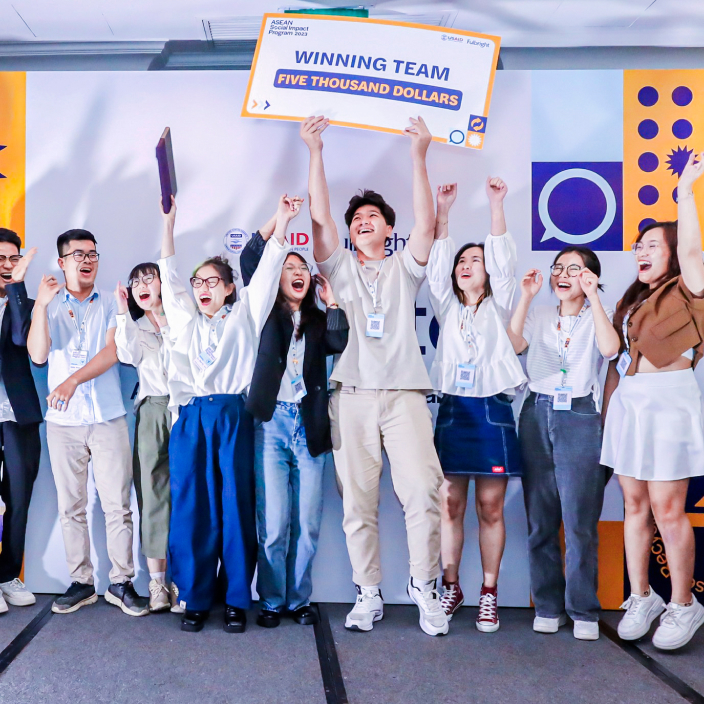
Education was one of the topics that the Vietnam Ambassador to the U.S Pham Quang Vinh and the U.S Ambassador to Vietnam Ted Osius mentioned during their discussion with the scholars at CSIS(*) in March 2015 in celebrating the 20-year relationship between Vietnam and the U.S. This was also the first time the two ambassadors participating in such event.
The partnership in education has to be the first breakthrough of the bilateral relationship between the two countries during the sanction period.
U.S. Secretary John Kerry’s career was almost ruined when he strongly opposed the Vietnam War.
The conservative party in American even aimed to politically ruin him for the difference in political viewpoint. Yet, John Kerry and many Vietnam War veterans played a crucial part during the normalization period and developing the Vietnam – U.S relations in the future. Things started simply with a ticket to a Broadway show in New York City.
THE WAY BACK
In early 1985, when the relationship between the two countries was still tense, Vietnam was still sanctioned, John Kerry, who was just elected to Senate at the time, bought a ticket to a Broadway show and invited Ambassador Hoang Bich Son (who later became the Chief of the Central Commission of Foreign Relations and Chairman of the Committee for Foreign Relations) in New York.
Kerry grew up in France and Ambassador Hoang Bich Son was fluent in French; French became the language for conversation. The Vietnamese delegation in New York was the main contact channel for both the Vietnamese and the American governments.
Joining Senator Kerry to that Broadway show was Thomas Vallely, a Vietnam War veteran and a member of the Massachusetts House of Representatives. Thomas Vallely became Kerry’s close friend after the shocking Winter Soldier hearing – an investigation on the crimes American soldiers committed in early 1970s and John Kerry was the pioneer of this campaign.
Vallely later became the campaign manager for Kerry’s first run for Congress in 1972. Though he lost for his view against the war, Vallely and Kerry became the best of friends and later partner in helping to normalize the relations between two countries.
Unfortunately, the Broadway show wasn’t that excited; Vallely remembered being restless next to Senator Kerry and Ambassador Son. He only felt lively again when the military attache accompanying Ambassador Son asked him whether or not he would like to visit Vietnam.
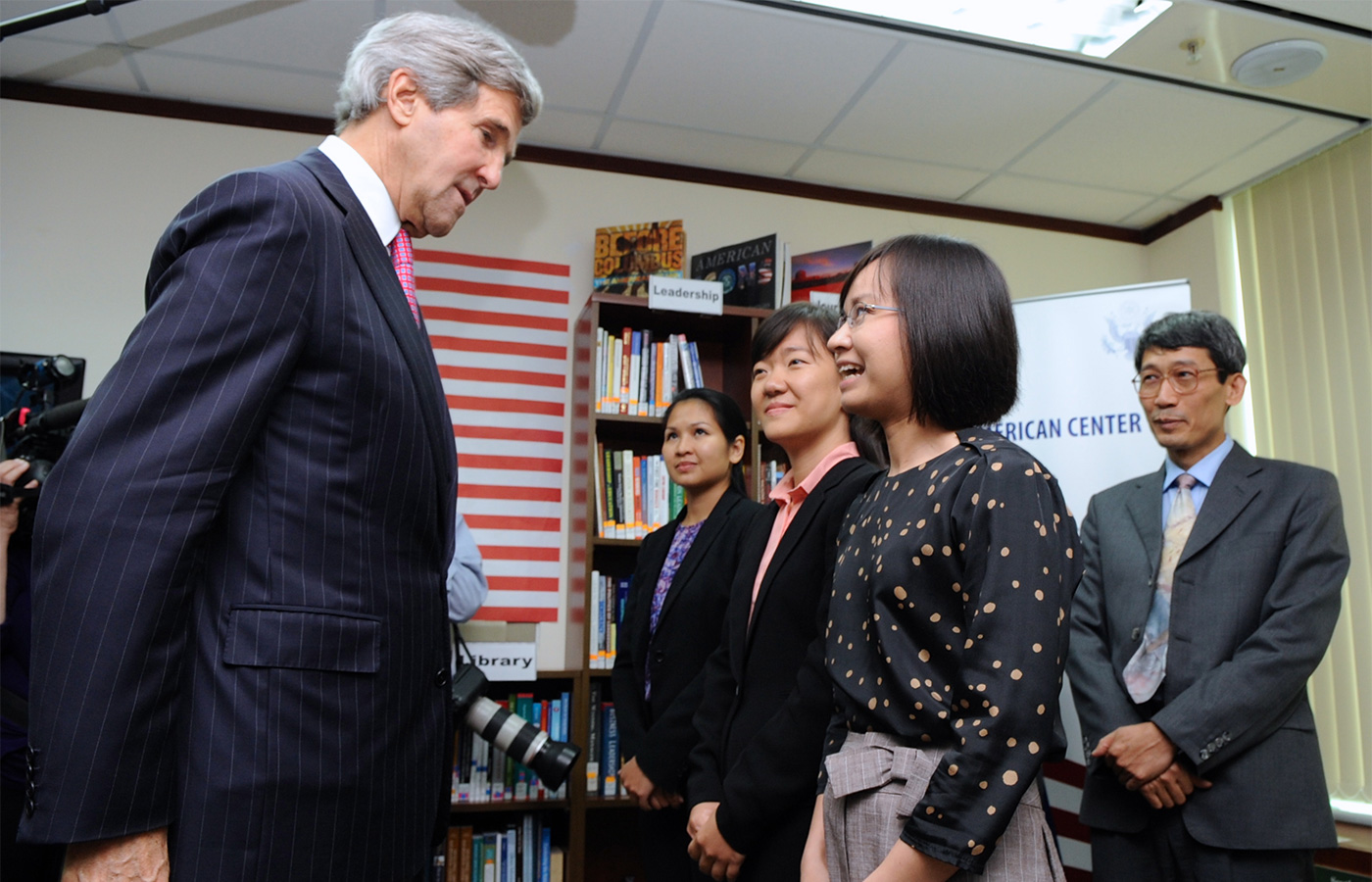
“I still remember when Senator John McCain came back to visit Hoa Lo prison that year; and when he left, he folded a rose origami and gave to a woman standing right outside. I loved that image and I wanted to be like him” – Vallely recalled.
“Our biggest lesson is from Mr. Hoang Tuy. He used to write for the Tia Sang newspaper; and he said that the problem in Vietnam was that Vietnam only knew how to compete with itself, from science, medicine to other industries. Vietnam only knew how to connect with itself. Hoang Tuy’s viewpoint is that in order to become better, you have to connect with the world” – Thomas Vallely.
Vallely came back to Vietnam right on the occasion of the 20th anniversary of the Vietnam War. “I met the Foreign Affairs Deputy Minister Le Mai and I was really impressed. I care about Vietnam” – he shared.
Yet, Vallely called his personal relationship with Vietnam a complicated one even though he deeply cared about the country, the people, and his good friends here.
“It’s like a love-hate relationship. Sometimes I love Vietnam; sometimes Vietnam drives me nuts” – he said. Those who met Vallely then recalled that he had this overwhelming way of talking, as though he would crush the other person with his words.
Former Director of Ho Chi Minh City External Relations Department and a senior diplomat, Vu Hac Bong recalled: “Tommy is candid to the point of being shocking.”
His trip back that time awoke Vallely’s deep interest and concerns about Vietnam. When Harvard University offered him a job, he turned down the proposed position at the time but said he would take it if there were to be any Vietnam-related program.
And the result was the Vietnam Program, which was established at Harvard University since 1986. The American Program was the first institute among leading American universities that studied on modern Vietnam during the “Doi Moi” (Renovation) period onward.
Also during this period, Senator Kerry started the process of normalization between the two countries. Senator Kerry also acted as the chief of Prisoners of War (POW) Committee and Missing-in-Action (MIA) Committee along with John McCain and Jesse Helms. POW and MIA were the main drives to loosen tension and foster communications for normalization.
BUDGET BILL 1991
POW/MIA solved the issue related to the consequences of war. But the real important milestone for the Vietnam – U.S. relations has to be the first ever funding for educational partnership in Vietnam in early 1991.
In the budget bill of 1991, Senator John Kerry, along with the support form veterans like John McCain…, succeeded in securing USD 300,000 for scholarships for Vietnamese students (Harvard later contributed another USD 300,000).
From this funding, the first group of Vietnamese of the Fulbright program such as Nguyen Thien Nhan, Cao Duc Phat… got the chance to study in America.
A few months before the bill was passed, Senator Kerry visited Vietnam with his two teenage daughters. The idea of educational partnership stemmed from that trip.
The activist on the ground who pushed the funding into the bill was Richard Kessler, Senator Kerry’s assistant and also the Vietnam War veteran. In 1992, the Fulbright scholarship program was introduced.
“At Fulbright, Xuan Thanh knows what is happening at Woodrow Wilson School of Public Policy at Princeton University, at Kennedy School at Harvard University, at Lee Kuan Yew School of Public Policy (the world’s top three Public Policy schools), in Australia, or Oxford… We connect with what is happening in the world. And that is what makes this university different from others in Vietnam” – Thomas Vallely shared.
At the same time, Vallely and a group of Harvard professors including Dwight Perkins, David Dapice, became the consultants for the National Planning Committee, led by Phan Van Khai.
There were two parts to the partnership: learning from other countries and from the East Asia, South East Asia regions like Korea, Taiwan, Indonesia…; and writing a book called In search of the dragon’s trailincluding series of strategic ideas deriving from other countries’ experience.
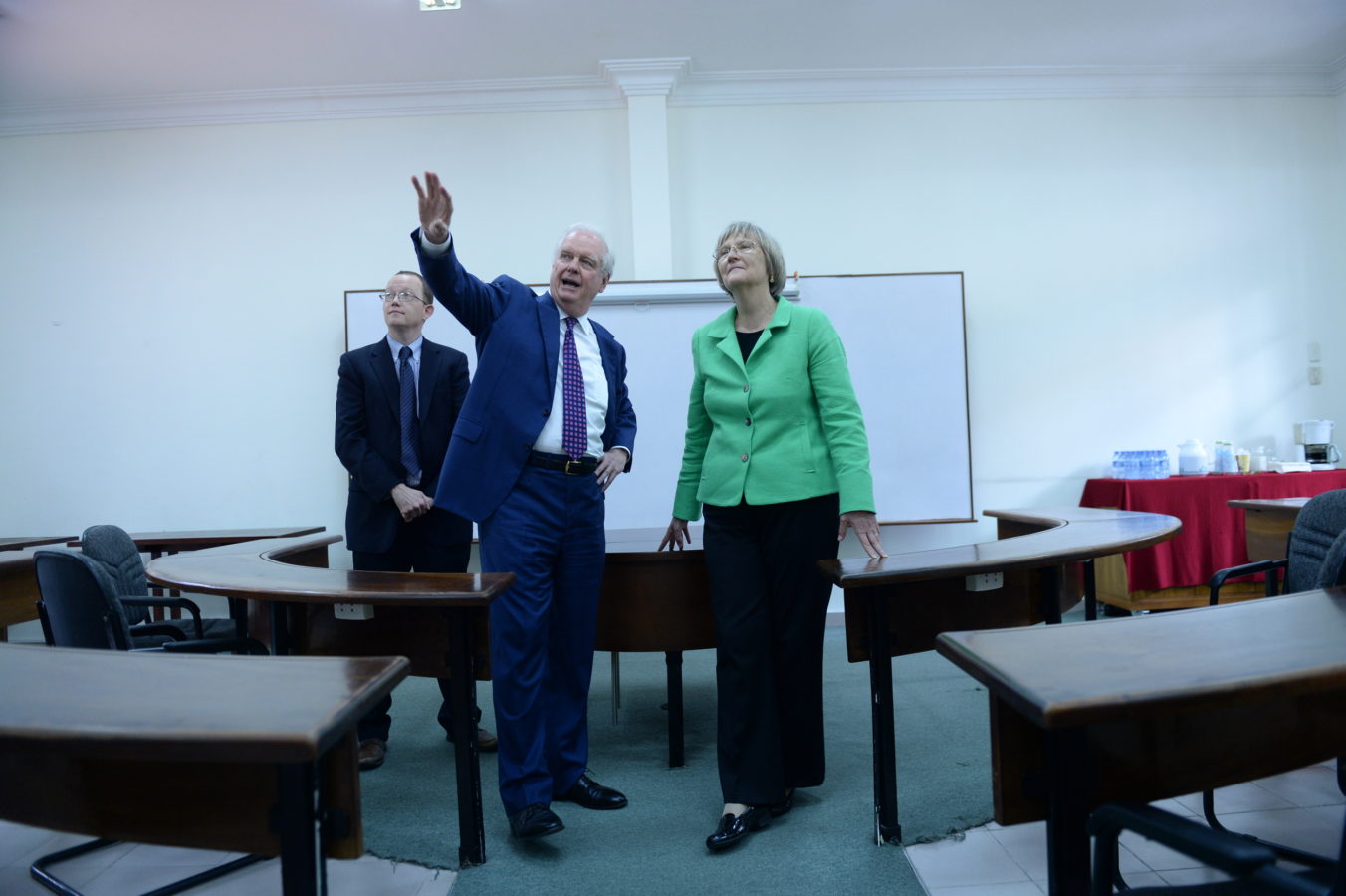
Yet, during their East Asia research trip, they could not find Vietnam in the statistical numbers featuring in economics research articles. ““Why isn’t there Vietnam,” they kept asking me that question,” Vallely recalled. Vietnam was completely closed off at the time and had no contacts with the outside world.
Foreign Affairs Deputy Minister Le Hoai Trung recalled: “Many comrades from the senior leadership paid much interest and read the In search of the dragon’s trailbook. I still remember being assigned by the Foreign Affairs Ministry to be the interpreter for the research group during the discussion with the delegation led by Dao Duy Tung, then the Permanent Secretary.
The Harvard’s research group wished to establish a consultant group for Dr. Luu Bich Ho’s Institute of Development Strategy in Hanoi.
Due to the “the unsuccessful marriage” (Dr. Luu Bich Ho’s sentiment), Vallely turned toward Ho Chi Minh City and established the Fulbright Economics Teaching Program (FETP). The program’s mission was simply to teach the most updated and suitable economical concepts to government officials.
During this period, with the support from the veterans, the funding for education in Vietnam kept rising from USD 300,000 to USD 1 million, to USD 3 millions. The diplomatic relations between the two countries was established.
In 1998-1999, Vietnam had to pay America back a public debt; this was the money the Saigon regime borrowed but after reunification, Vietnam had to take over. If failing to pay back the debt, Vietnam could not borrow from the international market.
Vallely and many Americans felt discontent that Washington took the money, especially from a country that was struggling economically like Vietnam. No one knew for sure that the money back then was really used to build infrastructure or to finance the war.
Vallely and his friends campaigned for a bill, in which this money would be used to build a Vietnam Education Foundation, which offered scholarships for technology and science.
The Embassy took over the Fulbright program; but the FETP program was still under Harvard University. In the beginning, the program was taught by American lecturers. Now, FETP is run by state renown experts like Vu Thanh Tu Anh, Xuan Thanh, Pham Duy Nghia… The program has trained many officials from both central and lower levels.
A Vietnamese diplomat shared that 20 years after normalization, Vietnam had become globally integrated. This made education program like FETP more meaningful: Vietnam needed to develop international-quality human resources now more than ever. He noted that: “That is still a long road when education in Vietnam is still old and full of hardship.”
FETP faced various challenges, especially during the early stage of ‘Doi moi’ (Renovation) period. Vallely recalled that Vu Hac Bong often reminded him: “You can be the accelerator; but when I tell you to stop, you stop.”
Challenges also came from America; especially during 1998-1999, certain members of the Consulate General wanted to close the program claiming that it did not follow the Fulbright mission of cultural exchange. When this got out, an urgent telegram was sent directly from Washington and signed by Secretary Madeleine Albright: “Fulbright name stays – Albright.”
The head of ASEAN’s Senior Officials Meeting (SOM), Ambassador Nguyen Vu Tu – who served a term in Philippines – shared that he used to suggest different places to a group of Filipino students who wanted to come and study Vietnam; among his recommendations was FETP.
The students were utterly impressed with the program. Their question remained: “Why is this program only for Vietnam and not for South East Asia?”.
(*): Center for Strategic and International Studies
By ANH NGUYEN (published on Tuoi Tre newspaper)
